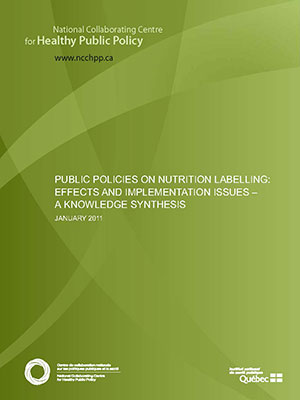This document illustrates the knowledge synthesis method adapted to public policies that the Centre has developed. It offers a practical overview of how to use this method to study a public policy (in the present case, nutrition labelling), and the results that it can produce: a knowledge synthesis presenting a host of evidence relevant to decision makers.
Methodological issues aside, decision makers and professionals in the healthy eating and nutrition sectors may be interested by the knowledge gathered in this document.
Numerous debates have emerged in recent years on the subject of nutrition labelling on pre-packaged foods and on restaurant menus. This knowledge synthesis is the first to document together the effectiveness of nutrition labelling in the fight against obesity, as well as its unintended effects, its equity-related issues, its costs, its feasibility, and its acceptability to stakeholders.
In order to gather knowledge on these different aspects in as comprehensive and as contextually-relevant a way as possible, different means were put to use: constructing the logic model for nutrition labelling, reviewing the scientific and grey literatures, and organizing deliberative processes to gather the experiential knowledge of Canadian stakeholders involved in the fight against obesity.
Public Policies on Nutrition Labelling: Effects and Implementation Issues – A Knowledge Synthesis
111 pages



